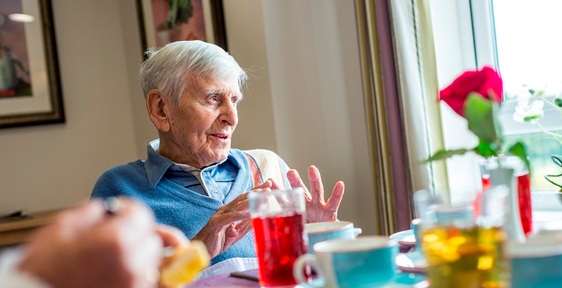Care provider reminds older people of the importance of breakfast during National Breakfast Week
Older people, including those in care homes across the UK, are being reminded of the importance of eating breakfast during National Breakfast Week.
The initiative promotes the advantages of eating a healthy breakfast and reminds older people that it is especially important for them to eat breakfast as their first meal of the day, promoting health and well-being.

Care provider, Care UK have produced a list of 'top tips' to support and encourage older people to eat breakfast. Nutrition and catering expert for older people at Care UK, Andrew Mussett commented: “During the night your glucose levels have plummeted. The brain needs glucose to function and low levels affect our cognitive abilities: in other words you’re not at your sharpest which can lead to falls and mistakes.
“The other issue for many older people is that their appetites diminish and eating sufficient calorie intake to keep them healthy and well-nourished is difficult. Additionally, many people with dementia have little interest in food and can find themselves losing weight.”
Breakfast provides energy and studies have proven that breakfast can help improve memory and concentration levels, as well as lowering stress levels and improving mood.
While eating a regular breakfast can help reduce obesity, high blood pressure, diabetes and heart disease and can help to restore glucose levels which are essential for brain function.
Mr Mussett added: “Breakfast can be staggered and take some time. Use it as a chance to reconnect with your loved one as well as an opportunity to give them vital glucose, fibre and vitamins.”
Care UK provide care and support services to more than 7,000 people across the UK in 110 care homes and 13 day care centres.
The list of 'top tips' is designed for people who provide care for older people or those who are worried a loved one might be losing interest in food or losing weight.
• Use fortified milk in cereal, porridge and drinks to help boost calories without causing bloating. This includes milk, dried milk and cream, making it easy to incorporate into someone’s daily intake;
• Keep a supply of smoothies in the fridge, as they’re brightly coloured, packed full of nutrients and fibre and are easy to drink to keep things moving;
• While butter may be the enemy of the dieter or those needing to watch their cholesterol intake, it is the friend of the slim older person. Packed with nutrients and calories it makes sandwiches easy to swallow;
• Hand food is great for those with co-ordination problems, shakes or for those with dementia who are always on the go. Muesli bars with chocolate are widely available, as are flapjacks and protein bars;
• Don’t be afraid to try new types of food or ingredients. As our taste buds diminish, our love of stronger tastes increases. Croissants may not have been part of their daily routine but they are light, fluffy and can be enhanced with more butter and jam for a calorie-packed boost. At other times of the day, we find curry nights are hugely popular in our homes. Just work with your loved one to see what they like these days - you might be surprised;
• Keep talking. Mealtimes are a great time to be sociable and reminisce. You can help by putting brands on the table that they will recognise from the past such as Kellogg’s and Quaker. Get out the newspapers and chat about the day’s events and talk to them about the day ahead;
• Get a loved one to help setting up the table or clearing away: people feel more engaged and valued when they feel they contribute in some way to a meal;
• Don’t see breakfast as a one-shot opportunity to get your friend or relative to eat. We may grab toast and race off to work but they may well have all morning to graze towards lunch.
Latest News
 29-Jul-24
Dementia Bus gives carehome.co.uk staff insight into life with dementia
29-Jul-24
Dementia Bus gives carehome.co.uk staff insight into life with dementia
 01-Mar-24
Find out the top care homes in 2024
01-Mar-24
Find out the top care homes in 2024
 21-Mar-23
UK's top care homes in 2023 revealed
21-Mar-23
UK's top care homes in 2023 revealed
 03-Jan-23
carehome.co.uk launches free care helpline
03-Jan-23
carehome.co.uk launches free care helpline
 13-Dec-22
5 mins with Emily Whitehurst, chief operating officer for Constantia Healthcare
13-Dec-22
5 mins with Emily Whitehurst, chief operating officer for Constantia Healthcare